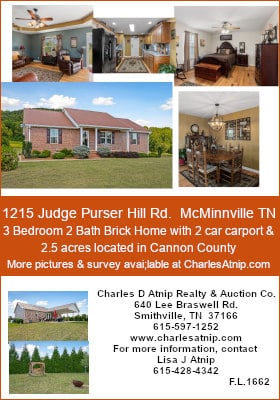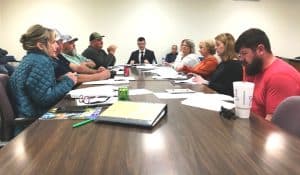News
DeKalb Fire Department Holds Graduation Ceremony for Citizens Fall Fire Academy
May 16, 2024
By:
The DeKalb County Volunteer Fire Department’s Citizens’ Fall Fire Academy just completed its six-week run with a graduation ceremony for the participants on Tuesday, May 14th, 2024.
“The purpose of this academy is to provide a behind-the-scenes look, from a citizens’ perspective, at the organizational structure, administration, operation, and response capabilities of the DeKalb County Fire Department and supporting agencies, such as the 911 Dispatch,” said Firefighter Alex Woodward who coordinates this program.
DeKalb Fire Department Citizens Fall Fire Academy: Video Producer: Firefighter Alyssa Harvey
https://youtube.com/shorts/Sk3QDCpnfB4?si=zxkdXHr1O7ujtYEt
Participants had the option of either observing or actually getting some hands-on experience by dressing up in firefighter turnout gear and operating department equipment including the jaws of life extrication tools under the supervision of the county firefighters.
“We are not trying to train people to be firefighters. This is more of an educational type of venture and, while participants have the opportunity to cut up a car using the jaws of life and use a fire hose to spray some water, it’s not a physically demanding program,” said Woodward.
Although the course is not primarily designed to recruit future volunteer firefighters, the department has picked up a few over the years because of the academy. “We have had people go through the program and their level of interest was high enough that they did later apply and become part of our fire department team,” added Chief Donny Green.
Members of this year’s academy were Cliff Carey, Janet Carey, Victor Harvey, Lissa Riley, Joanne Williams, and Larry Williams.
If you would like to know more about how to get on the participant list for next year’s Citizens’ Fire Academy, please contact Alex Woodward at 615-489-7292 or Chief Donny Green at 615-464-7176.
Corps of Engineers increase Center Hill Dam water releases
May 16, 2024
By:
The U.S. Army Corps of Engineers Nashville District has increased controlled spillway gate water release operations for Center Hill Dam in Lancaster, Tennessee.
Water release operations will continue until May 23 to accommodate recovery of flood control storage capacity following the significant rain event over the area this past week. USACE expects to increase overall water releases at Center Hill Dam to 23,000 cubic feet per second (cfs). This includes 11,500 cfs from hydropower generators and 11,500 cfs from spillway gate operation.
River conditions below Center Hill dam are extremely dangerous and the public is discouraged from recreating in the area. Boaters are urged to use extreme caution, wear life jackets and practice responsible water safety.
The district manages 10 locks and dams on the Cumberland River that serve various purposes. Wolf Creek, J. Percy Priest, Dale Hollow and Center Hill dams serve as flood storage projects. USACE main river projects used to maintain stable water levels for navigation are Cordell Hull, Old Hickory, Cheatham and Barkley locks & dams. USACE locks and dams continue to perform as designed throughout the Cumberland River Basin.
Various USACE Nashville District projects become particularly important during times of heavy rainfall. The National Weather Service provides USACE with radar rainfall estimates and forecasts of inflows to our reservoirs. USACE in turn provides real-time information and forecasts for the operations of projects and corresponding discharges which are incorporated into official river flood forecasts provided to the public.
The U.S. Army Corps of Engineers Nashville District manages the Cumberland River and its tributaries, balancing the demands for water releases to flood risk management, commercial navigation, production of hydropower, recreation, fish and wildlife, water supply and water quality.
Budget Committee Again Fails to Move Foward with Recommendation on Bond Resolution for Judicial Center
May 16, 2024
By: Dwayne Page
Denied again!
For the second week in a row, the budget committee has denied a proposal recommending to the full county commission that an initial and detailed bond resolution be adopted authorizing funding not to exceed $65 million for a judicial center once a new tax levy is established.
During Tuesday night’s meeting, the budget committee voted 4 to 2 against forwarding such a recommendation at this time. Only members Glynn Merriman and Chairman Jeff Barnes voted in favor. The other four members present, Tom Chandler, Sabrina Farler, Tony (Cully) Culwell, and Mathias Anderson voted against it. Member Susannah Cripps was absent. This vote did not include any recommendation on a funding source for the project even though that will have to be considered prior to adoption of the budget for 2024-25.
At the previous budget committee meeting on Thursday, May 9, the vote was 3 to 2 in favor, but it failed because a majority or four votes of the seven-member committee were needed in the affirmative to forward the recommendation.
In November, the jail committee, which is made up of the entire county commission, voted to recommend to the full commission that a judicial center be built rather than a new jail to meet needs and requirements for continued state certification. Last month the jail committee selected a construction option for a judicial center to be considered by the full county commission. The estimated cost is $63,817,500 (not counting purchase price for property and the expense of staffing). At that time, county officials said the project could require as much as a 65-cent property tax increase or a combination 47 cent property tax hike coupled with a $50 wheel tax. But during Tuesday night’s meeting, the county’s fiscal agent and financial advisor Steve Bates suggested that the property tax hike needed could be less, at up to 55 cents, which if approved would put the overall tax rate at $2.55 per $100 of assessed value. The tax rate is currently $2.00. A year ago, the county property tax rate was just over $1.73 until the county commission increased it by 27 cents with passage of the 2023-24 budget last June.
Without eventual passage of a bond resolution, recommended by the budget committee, County Mayor Matt Adcock said the judicial center project cannot move forward. Still, budget committee members seem to be struggling with how to handle this issue.
“I think everyone’s concern really is the funding aspect of it,” said budget committee member Mathias Anderson. “I am curious about all our options because right now its either a wheel tax, a property tax increase through either a percentage increase or would we have an increase without changing anything if there is a (property) reassessment? I mean are those the only three options as far as revenue goes?” I don’t have a clue how the property assessor is set up and what his numbers look like but would it be uncommon to do a (property) reassessment at this point,” asked Anderson.
“The only revenue source you have right now is the property tax,” explained Bates. “Anything else you want to implement later to offset that would have to be taken up for fiscal year 2025-26 if you have something (funding source) in place prior to that,” he said.
Budget committee members Sabrina Farler and Tony (Cully) Culwell seem to have reservations now about building a judicial center rather than a jail apparently based on public response.
“We have to build a jail. Not sure about a judicial center at this point. That’s where I am at,” said Farler.
“Me too” said Culwell.
“I know that scares us and it scares me because I want to move our county forward but I am just scared from what my constituents are saying. They are not calling and telling me to please vote for a judicial center,” Farler explained.
“Everybody knows we need a jail, but the justice center they (public) don’t see,” added Culwell.
Unless a new jail is built in close proximity to the courthouse, County Mayor Adcock said the sheriff’s department would have to transport prisoners back and forth from the jail to the courthouse every time court is in session and that could have an impact over time on the county budget in terms of fuel, personnel, vehicles, and other costs which would be recurring. That would not necessarily be the case if a judicial center is built, according to Adcock because the entire operation of the sheriff’s department, jail, and judicial system (courtrooms and clerks offices) would be in the same complex. And while a jail can be built outside the city, a judicial center, by law, must be inside the city limits of Smithville.
Although the jail committee has discussed and considered several possible sites both inside and outside the city for a judicial center, none have been selected for purchase. And annexation may no longer be an option. According to County Mayor Adcock, City of Smithville officials have signaled an unwillingness to annex any property selected by the county outside the city for a judicial center or jail.
County Mayor Adcock admonished the committee to not let public opposition sway their decision on this project.
“When people come and ask you about this have you (budget committee) explained to them why we picked a judicial center over a jail such as the increased costs in staffing, higher fuel and vehicle maintenance costs, buying buses to transport prisoners back and forth from the jail to the courthouse,” asked County Mayor Adcock
“The people that are making these statements (in opposition), they are not the ones in your seats that are responsible for making an educated decision on this. You can’t let the people out here who don’t have any idea what this situation is about to make the decision for you because you are the ones here with this information and you are the ones who have the responsibility to make a decision that is in the best interest of DeKalb County. The whole public doesn’t see the big picture,” said County Mayor Adcock.
“We are faced with the classic dilemma that also faces particularly members of our House of Representatives and Senate and that is do I do what my gut tells me is the right thing to do or do I do what my constituents are telling me do,” said budget committee member Tom Chandler.
“You have to do the right thing. It may be very uncomfortable but we all truly know what the right answer is,” replied County Mayor Adcock.
Budget committee member Glynn Merriman said he plans to stick with the plan that the jail committee/county commission decided to pursue.
“Here is the way I feel. We all voted to build a judicial center. We did. And I have the brass to stand up and state that I am going to stick with it,” said Merriman.
“I do have concerns about the weight of this (decision) falling on the budget committee,” said Chandler. “It shouldn’t be that way. It should fall on the full commission as a whole,” he said.
“The budget committee’s job is to compile a consolidated budget document and to recommend a tax levy to fund that budget,” Bates explained.
Chandler asked if the budget committee could simply present the full commission with the numbers as to the costs and tax levy needed to fund the project without making a recommendation.
“What happens if this committee does not vote to go forward to give a recommendation to the full county commission to do this? It seems to me it wouldn’t stop the full commission from voting and deciding whether or not to issue bonds for this,” said Chandler. “Is it possible for us (budget committee) to go to the commission and say here is the situation we are faced with. Here are the numbers that have been presented to us. We have considered the fact that you have said you wanted to build a judicial center. We have this budget and we have this outstanding desire on the part of the committee, we think, to build a judicial center. And then we say if you want to do that, this is what the tax levy has to be. It doesn’t say we (budget committee) are recommending that tax levy. It is simply saying this is what you must have if you want to do that (move forward). Its up to you now to collectively decide if you are going to do it,” said Chandler.
Bates said the budget committee could send over a proposal or budget without a recommendation, but it must establish a tax levy for the county commission to consider. If the commission should reject it, the budget committee would have to revisit it.
“You could present it to the board of county commissioners without a recommendation from the budget committee, but again the budget committee’s job is to set the tax levy to fund it,” explained Bates. Once you do that it goes to the board of county commissioners, but they will not be able to amend the tax levy resolution from the floor for debt service. That is the only fund (debt service) that you cannot amend from the floor. You (budget committee) have to set the tax levy in the consolidated budget for the board of county commissioners to consider. Once it goes to the floor and they consolidate the budget, they can amend the budget in any fund except debt service. If they don’t want to pass it, then you will either have to recess that meeting and reject the budget and the bond resolution, bring it back, cut the tax levy out of debt service, and then send it back to the board of county commissioners to pass it as is,” said Bates.
Whether the county commission moves forward with plans for a judicial center or changes it to a jail, Bates said it could still adopt the $65 million bond resolution and re-define the terms of the project.
“If you should decide to do only a jail, you can still do the bond resolution not to exceed $65 million, set the tax levy, and amend it to say the project is for a jail instead of a judicial center and be done with it,” said Bates
According to Bates, a property tax increase will be needed in the 2024-25 fiscal year as an initial funding source for debt service for a jail or judicial center even if a wheel tax is later adopted by the county commission or through a public referendum. If a wheel tax is eventually approved for the project, Bates said the property tax increase could be reduced to help offset it.
“Right now, its not going to be a wheel tax. Its going to be a property tax (to fund it) but even if you implement a property tax increase now that revenue won’t come in probably until February or March. If you want a wheel tax then you must adopt it at two consecutive county commission meetings by a two thirds majority and then if people protest it by petition, then it has to go to a public referendum, or you can vote to put it on the ballot in November. But regardless, you are going to have to increase the property tax now in this budget. Then if the wheel tax passes, you can cut the property tax back in the 2025-26 fiscal year. That way people have a choice of either funding this through a property tax, wheel tax, or a mix of both,” said Bates.
‘If you adopt an initial bond resolution and a detailed bond resolution authorizing the issuance of not to exceed $65 million in bonds, we (county) would sit on it (for now) because if you are going to issue bonds you must have a funding mechanism in place to pay that. You cannot go to a rating agency without a funding mechanism in place or you’ll get crushed. If you set the tax levy the revenue will be in place. That way, with the bond resolution in place, when you are ready to issue bonds which could be six or eight months later you already have the revenue coming into the debt service fund to pay the debt as it becomes due and payable. You cannot issue debt thinking that the money is going to come in. You must know it’s coming in,” explained Bates.
Again, the county commission has the option of voting in a wheel tax by a two thirds majority on two separate readings of a resolution, but the public could force a referendum by petition.
According to the election commission, the law states that “The petition must be filed by a number of registered voters amounting to at least ten percent (10%) of the votes cast in the county in the last gubernatorial election (locally 523 signatures); and the petition must be filed with the county election commission within thirty (30) days of final approval of such resolution by the county legislative body.
The next county budget committee meeting is set for Tuesday, May 28 at 6:00 p.m in the first floor meeting room of the courthouse.
« First ‹ Previous 1 100 190 198 199 200201 202 210 300 2506 Next › Last »











